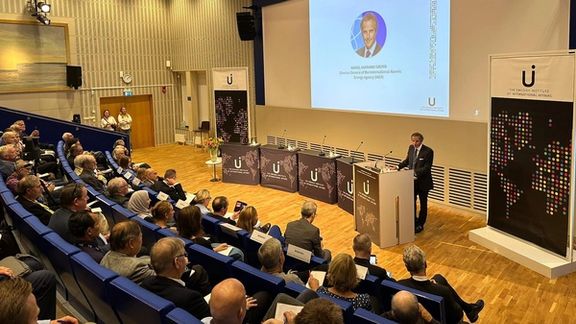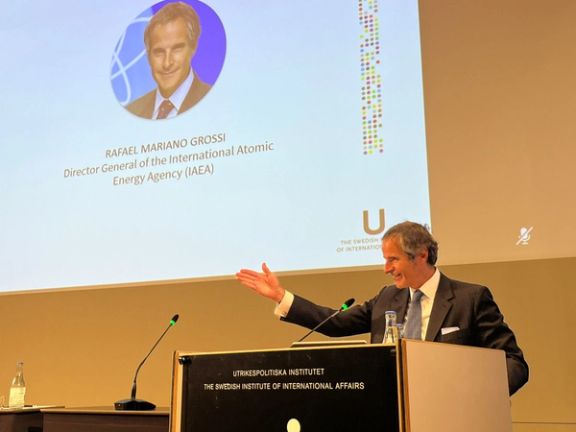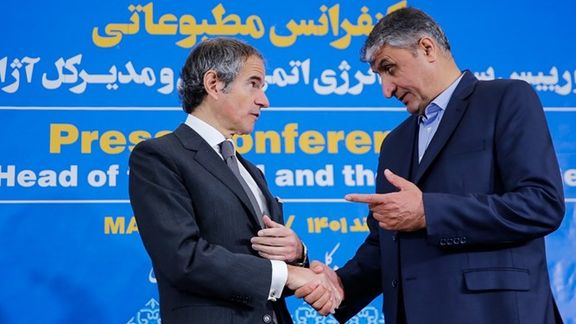Iran Needs To Show The World It Is Not Seeking Nukes – IAEA

The UN nuclear watchdog says Iran should give assurances to the world that it is not making nuclear weapons as it already has enough material to make several bombs.

The UN nuclear watchdog says Iran should give assurances to the world that it is not making nuclear weapons as it already has enough material to make several bombs.
Rafael Mariano Grossi, the director general of the International Atomic Energy Agency (IAEA), made the remarks during an event to address the nuclear challenges in Iran, Ukraine and North Korea, hosted by the Swedish Institute of International Affairs on Monday.
The IAEA chief stated that if Iran wants to continue enriching uranium at 60-percent level and higher, “they should know that [they] must give credible assurances to the international community about what they are doing to a stock of highly enriched uranium, for which the needs of a peaceful nuclear program are... not so clear.”

He also expressed concerns about Iran not coming clean about several issues regarding traces of uranium at several older sites. Without explicitly mentioning Israel, he said concerns about Iran’s nuclear program has prompted certain regional countries to hint at “taking some action about what is going on in Iran.”
Israel has repeatedly warned of action against its archnemesis Iran, highlighting that it will not be deterred by the Biden administration's efforts to restart any nuclear deal with Iran. "Israel will do what it needs to do to defend itself by itself against the threat of Iran to annihilate it with nuclear weapons,” Israeli Prime Minister Benjamin Netanyahu said earlier in August. He was referring to a recent unwritten prisoner exchange agreement between Washington and Tehran that many – such as Qatar – hope to expand to a multifaceted accord that contains the regime’s nuclear program and restrains its proxy militias in Iraq and Syria. There are also speculations by Iran-based media about a comprehensive deal in the making with the United States.
Grossi stressed the necessity of “a system, a program, be it JCPOA (Joint Comprehensive Plan of Action) or any other agreement or understanding that would allow the IAEA to have the visibility on Iran’s nuclear program, which is commensurate with the capability that Iran has.”
“Iran has accumulated enough nuclear material for several nuclear weapons,” Grossi said, emphasizing that “I must say Iran does not have nuclear weapons... It is important that we make the distinction between having the capabilities and having nuclear weapons.”
He underscored that it is also important not to lose sight of the fact that “we need to come to a point where Iran’s nuclear program is stabilized and where we have the diplomatic conditions and systems to provide credibility there.”
He added that it is a regrettable situation that the Russian invasion of Ukraine and its consequent worries have pushed concerns about Iran’s nuclear program out of the media and politicians’ attention. “We have not been able to come to a point where we can say that everything is ok.”

Grossi highlighted that following the US withdrawal from JCPOA under then-president Donald Trump in 2018, Iran gradually abandoned the restraints imposed by the agreement. “At the moment, although this agreement has not been declared as obsolete or dead... it is an empty shell,” he said, noting that “nobody is observing any commitment, provision, or obligation in this agreement.”
He pointed out that Iran is currently enriching uranium at 60 percent, underlining that back in January the IAEA sampled from a cascade of centrifuges at an enrichment plant in Iran and reached to the conclusion that Tehran is enriching at 84 percent. “Weapon level is 90 percent,” he explained.
In February, Iran’s Nuclear Agency Spokesman Behrouz Kamalvandi implicitly accepted the accusation, claiming that finding the highly-enriched uranium particles in the pipes connecting centrifuges was a “normal issue.” “It’s a natural thing in enrichment... The machine is spinning fast. If the amount of the feed decreases for a moment, the enrichment will increase by a few percent,” he said.
Despite recent reports saying that Iran has slowed the buildup of uranium needed for weapons, the regime’s nuclear chief said this week that enrichment is going on in accordance with a domestic law.
Mohammad Eslami, the head of the Atomic Energy Organization of Iran, was referring to the bill passed by the parliament in December 2020, dubbed the “Strategic Action Plan to Lift Sanctions and Protect Iranian Nation's Interest.” The bill obligated the government to step up Iran’s nuclear program and enrich uranium beyond the limits set by the 2015 nuclear agreement until US sanctions would be lifted.